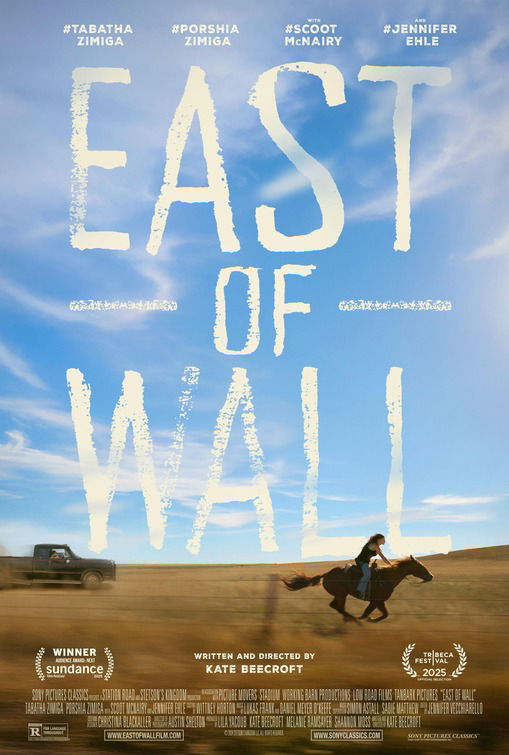“Positive Scenes Overcome by Darkness and Obscenities”

| None | Light | Moderate | Heavy | |
|---|---|---|---|---|
| Language | ||||
| Violence | ||||
| Sex | ||||
| Nudity |
What You Need To Know:
EAST OF WALL has some scenes of healing and family reconciliation. However, the production and entertainment quality are only fair. That said, some wide camera shots are gorgeous. They will make many viewers feel like they’re riding horses along with the characters. Sadly, despite its positive content, EAST OF WALL has a strong humanist worldview that feels godless and forgotten. The movie includes lots of strong foul language and disturbing discussion of suicide, self-harm and abuse. So, MOVIEGUIDE® rates EAST OF WALL as ultimately depressing, excessive and unacceptable.
Content:
Strong humanist worldview focuses on the feeling that it’s people’s connections to the land that sustains them, not God, so the world in the movie feels godless and forgotten, but there are some scenes of healing and family reconciliation, plus woman talks about her husband being a Christian and not committing suicide for a long time because he didn’t want to go to Hell, but that he eventually did kill himself;
At least 47 “f” words, 28 obscenities (including about 20 “s” words), seven light profanities, and three middle fingers;
Descriptions of extreme violence with a major self-harm/ suicide trigger warning such as teenager starts to pull her hair out, a snake eats a rat, three stories told by woman’s friends of men abusing women, and woman tells the story of finding her husband dead in his truck with a bullet through his head, she describes that one of his eyeballs was hanging out of his head, and she says, when she tried to perform CPR, his blood gushed into her mouth;
No sex;
No nudity but older woman’s shirts often show a lot of cleavage, she is naturally a large chested woman, but most of her shirts felt purposefully low;
Apple moonshine is served at a gathering, there is one scene at a bar, and there are at least three more instances where men are drinking beer;
Five instances of cigarette smoking, but not drugs; and,
An entire family is dysfunctional that is what the plot is based on, plus the teenagers are rebellious, the adults lie, and greed and desperation enforce one another in the characters’ lives.
More Detail:
Great at exposition, EAST OF WALL slowly reveals that Tabatha’s husband committed suicide. Her daughter, Porshia, a skilled rodeo horse rider, blames her for it. At several rodeos, parents come up to Tabatha and thank her for housing their children and promise that payment will be coming soon. There is also the classic plot of being behind on bills and having the antagonist offer to buy the ranch if they can’t earn the money.
In the end, Tabatha and Porshia reconcile. Viewers are left with the message from Porshia that, even though people say the Badlands they live in are cracking, she doesn’t think so because they are still holding her family. This comment makes a wonderful link into the characters’ emotional cracking foundation throughout the movie, but it still shows the strength they need to carry themselves through terrible trials and tribulations.
However, the production and entertainment quality in EATS OF WALL are only fair. The wide camera shots are gorgeous and make viewers feel like they’re riding horses along with the characters. The rest of the story is shot similar to a documentary with what looks like mostly handheld cameras. Though this was most likely done for time’s sake, the shakiness added to the raw atmosphere of the world surrounding the characters. The soundtrack is also very authentic to the setting and people.
EAST OF WALL has some Christian elements where Tabatha sits with her friends and begins talking about her husband’s suicide. She talks about how he was a Christian and had wanted to die for a long time but was scared to go to Hell. So, there’s a recognition in the story about something above the characters. However, the movie focuses on the hardships people endure and stays in that world. So, ultimately, when Porshia talks about the Badlands holding her family, the movie moves away from God. Despite that, some healing occurs when Tabatha rides a horse again and reconciles with her daughter, Porshia.
Sadly, though, many scenes in EAST OF WALL focus on lots of talk about physical abuse, suicide and self-harm. Also, the movie has several scenes with smoking and drinking and lots of strong, gratuitous foul language. So, MOVIEGUIDE® rates EAST OF WALL as ultimately depressing, excessive and unacceptable. The movie has a strong humanist worldview that feels godless and forgotten.



